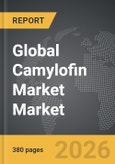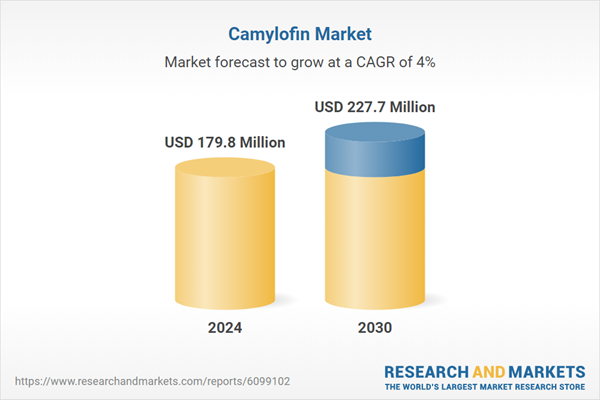Global Camylofin Market - Key Trends & Drivers Summarized
Why Is Camylofin Emerging as a Valuable Therapeutic Option in the Management of Gastrointestinal and Smooth Muscle Spasms?
Camylofin, a dual-action antispasmodic drug with both anticholinergic and direct smooth muscle relaxant properties, is increasingly used in the treatment of gastrointestinal, biliary, and genitourinary spasmodic conditions. Its mechanism - combining calcium channel blockade with parasympathetic inhibition - enables effective relief from abdominal colic, irritable bowel syndrome (IBS), renal colic, and functional dyspepsia. The drug is commonly administered in combination with other agents like paracetamol or diclofenac for synergistic pain relief, making it a preferred choice in acute care and outpatient settings across emerging markets.As gastrointestinal disorders become more prevalent due to lifestyle changes, stress, and dietary factors, demand for rapid-onset, non-opioid spasmolytics is growing. Camylofin's established safety profile, particularly in pediatric and maternal populations, further reinforces its role in managing visceral pain and functional gastrointestinal disorders - positioning it as a staple product in primary care, gastroenterology, and obstetric practice.
How Are Fixed-Dose Combinations and Formulation Versatility Enhancing Camylofin's Market Appeal?
Camylofin's widespread clinical use is supported by its availability in various dosage forms - including tablets, oral suspensions, and injectables - enabling flexible administration across age groups and care settings. Fixed-dose combinations (FDCs), particularly with analgesics or antipyretics, are driving commercial differentiation and patient compliance by offering multi-symptom relief in a single formulation. In pediatric segments, flavored suspensions with precise dosing capabilities are enhancing usability and adoption in colic and gastrointestinal distress management.Pharmaceutical companies are increasingly focusing on branded generics and region-specific formulations to capture share in high-volume outpatient drug markets. New delivery platforms with improved stability, bioavailability, and taste masking are also being explored to meet regulatory and consumer expectations - especially in markets with high self-medication rates and reliance on OTC therapies for gastrointestinal discomfort.
Where Is Demand for Camylofin Growing and Which Therapeutic Areas Are Driving Utilization?
Asia-Pacific and Latin America are key markets for camylofin, with high prescription rates in countries such as India, Brazil, and Mexico - driven by widespread use in abdominal pain, antispasmodic therapy, and maternal care. In India, camylofin is a widely used component in prescription FDCs, supported by its inclusion in numerous national and regional pharmacopoeias. Its use is also gaining traction in parts of the Middle East and Africa, where gastrointestinal disorders remain common and access to low-cost, fast-acting therapeutics is essential.Therapeutic applications are centered on gastrointestinal and urinary tract spasm relief, with notable usage in dysmenorrhea, labor pain management, and infantile colic. Hospitals, primary care clinics, and maternity wards represent key prescribing environments. Additionally, rising awareness among general practitioners and OTC availability in select regions are increasing usage in community-based and self-managed care scenarios.
What Is Fueling the Global Growth of the Camylofin Market?
The global camylofin market is being driven by increasing incidence of abdominal colic, growing demand for affordable, non-opioid spasmolytics, and the rising prevalence of gastrointestinal functional disorders. Its inclusion in combination therapies, clinical acceptance across diverse patient profiles, and broad regional registration support continued market expansion. Generic penetration, local manufacturing in cost-sensitive markets, and high-frequency prescription volumes are making camylofin a commercially attractive molecule for regional pharma players.Regulatory approvals, growing availability in liquid and injectable forms, and favorable risk-benefit assessments are reinforcing its status in antispasmodic therapy portfolios. As healthcare systems seek efficient management of pain and spasmodic conditions without relying on narcotics or high-cost therapies, a key question emerges: Can the camylofin market sustain long-term relevance through formulation innovation, rational combination strategies, and market-specific product adaptation - while meeting the therapeutic demands of underserved and volume-driven care environments?
Report Scope
The report analyzes the Camylofin market, presented in terms of market value (US$). The analysis covers the key segments and geographic regions outlined below:- Segments: Indication (Muscle Spasm, Renal Colic); Formulation (Oral, Parenteral, Other Formulations); End-User (Hospitals, Specialty Clinics, Home Care, Other End-Users).
- Geographic Regions/Countries: World; United States; Canada; Japan; China; Europe (France; Germany; Italy; United Kingdom; Spain; Russia; and Rest of Europe); Asia-Pacific (Australia; India; South Korea; and Rest of Asia-Pacific); Latin America (Argentina; Brazil; Mexico; and Rest of Latin America); Middle East (Iran; Israel; Saudi Arabia; United Arab Emirates; and Rest of Middle East); and Africa.
Key Insights:
- Market Growth: Understand the significant growth trajectory of the Muscle Spasm Indication segment, which is expected to reach US$161.2 Million by 2030 with a CAGR of a 4.7%. The Renal Colic Indication segment is also set to grow at 2.5% CAGR over the analysis period.
- Regional Analysis: Gain insights into the U.S. market, valued at $49 Million in 2024, and China, forecasted to grow at an impressive 7.5% CAGR to reach $46.6 Million by 2030. Discover growth trends in other key regions, including Japan, Canada, Germany, and the Asia-Pacific.
Why You Should Buy This Report:
- Detailed Market Analysis: Access a thorough analysis of the Global Camylofin Market, covering all major geographic regions and market segments.
- Competitive Insights: Get an overview of the competitive landscape, including the market presence of major players across different geographies.
- Future Trends and Drivers: Understand the key trends and drivers shaping the future of the Global Camylofin Market.
- Actionable Insights: Benefit from actionable insights that can help you identify new revenue opportunities and make strategic business decisions.
Key Questions Answered:
- How is the Global Camylofin Market expected to evolve by 2030?
- What are the main drivers and restraints affecting the market?
- Which market segments will grow the most over the forecast period?
- How will market shares for different regions and segments change by 2030?
- Who are the leading players in the market, and what are their prospects?
Report Features:
- Comprehensive Market Data: Independent analysis of annual sales and market forecasts in US$ Million from 2024 to 2030.
- In-Depth Regional Analysis: Detailed insights into key markets, including the U.S., China, Japan, Canada, Europe, Asia-Pacific, Latin America, Middle East, and Africa.
- Company Profiles: Coverage of players such as Aarti Pharmalabs Limited, Alpspure Lifesciences Pvt. Ltd., Archer Daniels Midland Company (ADM), BASF SE, Cargill, Incorporated and more.
- Complimentary Updates: Receive free report updates for one year to keep you informed of the latest market developments.
Some of the 47 companies featured in this Camylofin market report include:
- Abbott Healthcare Pvt. Ltd.
- Alkem Laboratories Ltd.
- Arlak Biotech
- Bio Sidus
- Bosnalijek
- Cormedix
- Enomark Biotech
- Gedeon Richter
- Hetero Labs
- Jigs Chemical
- Leeford Healthcare Ltd.
- Merck KGaA
- Novolab Gynecare
- Piramal Pharma Solutions
- Teva Pharmaceuticals
- Zydus Cadila
- Simson Pharma Limited
- Pharmaffiliates
- Arlig Pharma
- Orion Life Science
This edition integrates the latest global trade and economic shifts into comprehensive market analysis. Key updates include:
- Tariff and Trade Impact: Insights into global tariff negotiations across 180+ countries, with analysis of supply chain turbulence, sourcing disruptions, and geographic realignment. Special focus on 2025 as a pivotal year for trade tensions, including updated perspectives on the Trump-era tariffs.
- Adjusted Forecasts and Analytics: Revised global and regional market forecasts through 2030, incorporating tariff effects, economic uncertainty, and structural changes in globalization. Includes historical analysis from 2015 to 2023.
- Strategic Market Dynamics: Evaluation of revised market prospects, regional outlooks, and key economic indicators such as population and urbanization trends.
- Innovation & Technology Trends: Latest developments in product and process innovation, emerging technologies, and key industry drivers shaping the competitive landscape.
- Competitive Intelligence: Updated global market share estimates for 2025, competitive positioning of major players (Strong/Active/Niche/Trivial), and refined focus on leading global brands and core players.
- Expert Insight & Commentary: Strategic analysis from economists, trade experts, and domain specialists to contextualize market shifts and identify emerging opportunities.
Table of Contents
Companies Mentioned (Partial List)
A selection of companies mentioned in this report includes, but is not limited to:
- Abbott Healthcare Pvt. Ltd.
- Alkem Laboratories Ltd.
- Arlak Biotech
- Bio Sidus
- Bosnalijek
- Cormedix
- Enomark Biotech
- Gedeon Richter
- Hetero Labs
- Jigs Chemical
- Leeford Healthcare Ltd.
- Merck KGaA
- Novolab Gynecare
- Piramal Pharma Solutions
- Teva Pharmaceuticals
- Zydus Cadila
- Simson Pharma Limited
- Pharmaffiliates
- Arlig Pharma
- Orion Life Science
Table Information
| Report Attribute | Details |
|---|---|
| No. of Pages | 380 |
| Published | February 2026 |
| Forecast Period | 2024 - 2030 |
| Estimated Market Value ( USD | $ 179.8 Million |
| Forecasted Market Value ( USD | $ 227.7 Million |
| Compound Annual Growth Rate | 4.0% |
| Regions Covered | Global |








